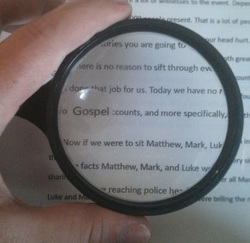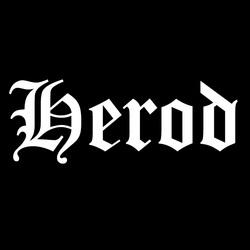 OK y'all, it's time to put on our Sherlock Holmes hat, (we'll forgo the jacket because of how hot it is right now), pull out your magnifying glass and let's dig into scripture. We need to investigate. Delving into the text, we will discover the story of the feeding of the multitude can be found in not just two, or even three, but all four gospels. Depending on how you sift through the evidence, the five loaves and two fish story is retold up to six times in the New Testament! It's no wonder the story is recounted by every gospel writer- there were a lot of witnesses to the event. Depending on which telling you focus on there were between 4,000-10,000 people present. If we were a collective Professor Holmes, this knowledge should make our head hurt. The more witnesses there are to an event, the more stories the budding detective is going to hear. This is both great and problematic. Gratefully there is no reason to sift through even 1,000 accounts of the five lives and two fish story. Time has don that job for us with the help of the Gospel writers. Today, we have no more than four to six accounts to look at. We will focus on the four Gospel accounts, and more specifically, what Matthew had to add to the story. Now if we were to sit Matthew, Mark, Luke and John in separate interrogation rooms and grill them on the facts Matthew, Mark, and Luke would have very similar stories to tell. Maybe they were sharing facts before reaching police headquarters. After all, Mark was the closest to the event, maybe Luke and Matthew wanted to make sure they were telling the right things. But then, John just seems to be in left field and actually more protective than the other three. While the other three kinda just lay out the events and let the text speak for itself, John needs to add some reasoning behind the events. Like John believes part of asking the Disciples to feed the people was because Jesus wanted to test his followers. No such explanation is given by the other three. Now I am focusing too much on John, we want to focus on Matthew.  The thing about Matthew, if we were to enter into his interrogation room and set up a basic profile on him, we would notice his disregard for time. He probably wouldn’t wear a watch and he most definitely wouldn’t keep a calendar. He wouldn’t necessarily put events in chronological order for the sake of getting the story right. He would be more likely to pair events together out of order in order to compare or contrast a situation. The clue that tips us off that Matthew wants us to compare the feeding of the 5,000 story to another lies in the first line of scripture from the text: “Now when Jesus heard this, he withdrew from there in a boat to a deserted place by himself.” Heard what? Jesus didn’t hear anything in the other three Gospels. Investigating, you back track and see Matthew had placed a story in an interesting place. The story in question, that wasn’t placed there by any of the other Gospel writers, was the beheading of John the Baptist.  If you are a little dusty on the story, let me help you out a little. Herod Jr., or as Matthew chooses to call him just plain Herod, was as dirty and low as his father was back when Jesus was a baby. See, little Herod wanted to marry his brother’s wife: Herodias (don’t get too caught up on the names, Herod Senior was extremely egotistical and enjoyed praising himself to a narcissistic level. Herodias was married to her Uncle whose name was also Herod, although Matthew calls him Philip.) Well, John the Baptist, who didn’t mince words told Junior he couldn’t marry his brother’s wife who was also his blood. That was wrong. And how did this tetrarch respond to John’s bluntness? He bound him and threw him in jail, of course. He would have killed him right away but was fearful of how the crowds would react. John was only kept alive for Herod’s self-preservation; that’s it. Well, some time goes by and little Herod turns a year older. In true family fashion Junior has a huge party to celebrate. At the party little Herod is drawn in by, of all people Salome. (Salome was Herodias’ daughter- or Herod Junior’s niece.) She is dancing real pretty for him and he is taken in by display. I don’t think I need to go into more detail than that. You must realize by now that Herod’s family is saucier than a FX show. Needless to say little Herod promises the girl anything and from the urging of her mother she asks for John the Baptist’s head on a platter. What a terrible celebration; what a horrible meal! Who knows if Herodias was trying to set her brother in law/ uncle up to be overtaken by the crowds or just had a terrible thirst for bloodshed. Maybe both. Either way Matthew sits this selfish and self-centered story in contrast with our scripture for today. Why?  When you understand what a bad celebration looks like it can bring out the best of a good celebration. Now maybe Jesus was withdrawing to mourn the death of his cousin or maybe not. Either way, it wouldn’t be difficult to believe Jesus is dealing with a variety of issues, with one of them being the death of his cousin. A leader has to make sacrifices and become a servant for the people they are leading. In all four gospels Jesus is headed for a deserted place. Jesus always goes to a deserted place to reflect and renew. He obviously felt he needed the time. However, when he sees the crowds instead he changes his plan. He feels compassion. He takes the selfless route and begins saving the people. (Back at the 2011 General Assembly the group I was with went to church on Sunday to hear Fred Craddock. He shared that the Greek word for saved in the bible is the same as cure. So whether you believe he was curing or saving people- Jesus sacrificed what he wanted to give others what they needed.) The more leadership you have the more accountable you are to others. Now in Herod’s celebration lust and selfishness led to the end of something. The Golden Goose was slaughtered. John the Baptist was executed. Herod was a leader for the sake of himself and no one else. His leadership style led to death. Jesus’s celebration was about loving and giving. Through his sacrifice, people were cured, saved, and fed. God’s love was expanded that day undoing Herod’s damage in killing a prophet. The word Pastor means shepherd. As part of this fellowship I am not the only shepherd. We are all capable of standing up and becoming leaders in Christ's fellowship. Many of us had or have leadership roles. We just need to remember what it means to be a leader. Leadership is not about adulation and praise. It is not about always getting what you want. Leadership is about compassion and being with your flock. Leadership is about becoming a servant for the sake of those you serve. The miracle in today’s scripture happened because of the leadership style of Jesus. Hate won the battle at Herod’s birthday party but love won the war with Jesus’ bread and fish. We all have opportunities to lead. Lead with love and change the world for good.
|
Categories
All
Archives
October 2023
|



 RSS Feed
RSS Feed